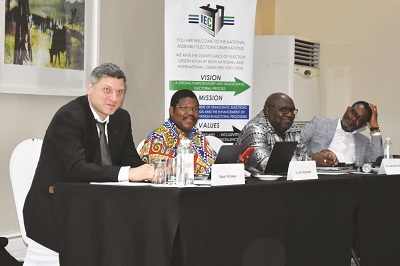By: Thandiwe Kubere
The Independent Electoral Commission (IEC), in collaboration with the United Nations Development Programme (UNDP) and relevant stakeholders, discussed finding strategic and sustainable solutions to the voters’ registration process in Lesotho, as a continuing effort to make the electoral cycle seamless.
In ensuring the possibility of such, IEC organized a roundtable conference with national and international experts to comprehensively discuss challenges faced in the development and maintenance of enhanced accuracy of the Voter Register in Lesotho and figure out strategic solutions that would shape the future election process.
Presenting on challenges encountered by the commission during the election process, IEC Director Mpaiphele Maqutu declared there is no unique identification and there is no accurate proof of the authentic documents which are required from voters as they engage in the election process. For instance, there was no distinctive documentation required at the previous elections, leading to people showing up with multiple documents, some came with voter’s cards, others came with Identity Documents (IDs), and others with driver’s licenses with no proof of being issued by the government, further leading to more confusion which consumed valuable time and affected the process.
Other mentioned common problems encountered include duplicated electors, deceased electors, and misplaced electors. Duplicate electors significantly impact the integrity of the election process and commonly happen when people have the same names but are in different jurisdictions. Moreover, they have witnessed cases of mismatched identification numbers in the system due to sharing similar names, resulting in other people not being able to vote. Cases of Deceased electors take place when families fail to report deceased electors to chiefs so that they may be removed from the Voter’s roll, therefore compromising the process. IEC experienced challenges of Misplaced electors when villages were shifted as a result of new boundaries and most voters anticipated that they were still at the previous voting station whereas they were not. They were therefore told to return and vote where their names appear, causing distress and lack of voting interest.
Chief Technical Advisor UNDP Lesotho Shalva Tskhakaya declared the purpose of the roundtable discussions was to join skills and collaboratively find solutions to the problems encountered, and to as well identify the need for legal reforms and Technical Corporation. He noted the reason for coming up with strategies early and before the elections, was prompted by the realization that when challenges are encountered at the exact time of elections, decisions and solutions are hastily sought at that time, and those are often not sustainable and only short term.
On that note, as a way of coming up with sustainable solutions, the African Election Fund Process, funded with a €3 million initial commitment by German Cooperation and implemented by UNDP, was established to strengthen democracy in Africa through innovative, agile, and timely support to the electoral processes. Tskhakaya revealed Lesotho was one of the eight African Countries selected to pilot the project. “It works with the hope to ensure transparent, credible, and fair elections in Africa,” he enlightened.
The Fund will provide the means to accelerate activities, pilot new approaches, including the use of technologies, manage associated risks and facilitate further collaboration among African Member States and at the regional level. The fund aims to support fair and free elections and serve as a platform for learning and the exchange of practices across different experts and stakeholders. It also gives the commission and relevant authorities the chance to act early, when there is a suspected coming of conflicts.
The fund also addresses how rapid technological evolution offers the potential for greater inclusion of citizens, but equally addresses the increasing pace of unverified or inaccurate information sharing, impacting trust in media and democratic processes. To ensure that factual and accurate information is disseminated, the commission assured to improve its communication and hold media capacitating projects and to as well review and inform the social media policy such that misinformation is reduced.
Ministry of Home Affairs Deputy Principle Secretary ‘Mamakopoi Letsie stated some of the challenges that previously prevented the ministry from effectively supporting and improving the voter registration as well as the electoral cycle was the lack of the financial muscle to do so because of the low budget, causing failure to implement the plans made. She further declared the country uses outdated legal framework and policies which results in a gap between the ministry and the commission.
She declared there is a struggle in continually applying technical methods including having register maintenance for unique identity; constantly updating individuals’ vital life events such as issuing birth certificates right after birth, and ensuring the availability of IDs, marriage certificates, and death certificates.
She advised making sure that many people are registered, especially in the rural areas where challenges arise due to having a smaller number of registered people. Additionally, she enlightened the ministry is currently working on establishing registration services which will be available to villagers at their local community councils to save travelling costs and time. The ministry also assured to strategize on digitalization so that people can explore information technology (IT) solutions and easily access services at their convenience. There was also a generic interface developed to enable the verification of documents.
The IEC strategic plan is intended to be finalized early this year and will cover the next electoral cycle from 2024 to 2028. This will be carried out while still considering the voter registration principles which are; accessibility, accountability, comprehensiveness, cost effective, credibility, and effective external assistance. “Three years is not a long time for finding sustainable solutions, so let us roll up our sleeves. As part of this process, we have the institutional development consultants in the country who look into some of the policies, preferably communication and the structure of the IEC to inform the outcome.” Tskhakaya further noted that it is important for different agencies to hold hands. “Please create a platform for future corporations”, he said.


